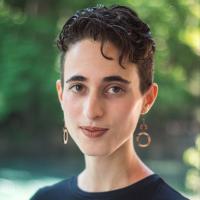- Folk Tale & Oral Literature
- Diaspora
- Eastern Europe / Russia
- Jewish Studies
- Middle East/North Africa
- C19
- C20, including Modernism
- C21/ Contemporary
- Digital Humanities
- Linguistic Theories and Culture
- Race and Empire
- Translation
I am a translator, researcher, and language advocate. Before beginning my PhD at Penn, I worked in journalism and editing. You can find examples of my work in each of these areas below.
Last updated: Summer 2023.
My language advocacy work includes:
- Free, personalized Juhuri language lessons for community members who do not have access to Russian as a gateway language. Please contact me at kohen@sas.upenn.edu for availability, and please note that I am not myself Juhuri--I have studied the language with tutors and writers rather than family members.
- Working with Valeriya Nakshun to organize young Juhurho and promote Juhuri culture in English <https://youtu.be/-QpTjBEDtqM> <https://jewishcurrents.org/office-hours-valeriya-nakshun>
- Spreading the word about Juhuri cultural activism through English-, Russian-, and Turkish-language platforms <https://www.avlaremoz.com/2023/08/17/mardahay-ovsolum-sibiri-kafkas-yahudilerin-siiri-ve-savasi-hilah-kohen/>
- Collaborations with the Jewish Language Project, including a lecture about the Juhuri language and contributions to the exhibit "A Millennium of Jewish Women's Voices" <https://youtu.be/w3gqadluX3I> <https://www.jewishlanguages.org/women>
- Lectures and publications for educators in the field of Slavic and Eurasian Studies, e.g., Kohen, Hilah, Irina Sadovina, Tetyana Dzyadevych, Dylan Charter, Anna Gomboeva, Lenore A. Grenoble, Jessica Kantarovich, and Rossina Soyan. “Teaching and Learning Indigenous Languages of the Russian Federation.” Russian Language Journal / Русский язык 71, no. 3 (2021): 89–115.
My current research interests include:
- Language advocacy in literature: As state-backed varieties of English and Russian have shaped world literature in the last 100 years, how have writers (especially Juhuri writers) attempted to prioritize the languages of their own communities? How have writers built multilingual networks and used literature to increase or decrease language access?
- Language-building as nation-building in the twentieth century: How did the creation of Modern Turkish, Modern Hebrew, and similarly reconstructed Soviet languages during the early twentieth century change how nationalism and colonialism function? What methods, ideas, and people connected these three language-building projects?
My scholarly publications and presentations include:
- “The Global Circulation of Literary Language Choice: From Juhuri to Gĩkũyũ,” a research article under revision following first-round peer review
- “Survival by Collectivity: Audience Participation in Marginalized Post-Soviet Media,” a public lecture hosted by the Department of Russian and Slavic Studies, University of Arizona, October 2021.
- The Russian Language Journal article mentioned above, and Kohen, Hilah, Katherine M. H. Reischl, Andrew Janco, Susan Grunewald, and Antonina Puchkovskaia. “Reading Race in Slavic Studies Scholarship through a Digital Lens.” Slavic Review 80, no. 2 (Summer 2021): 234–44.
- “How Queer Russophone Writers Don’t Make it in English: A Non-Translation Process, 1916-2020,” a public lecture hosted by the Program in Russian, the Program in Gender and Sexuality Studies, and the Department of English Literature; Swarthmore College; October 2020.
My literary translation and editing work includes:
- Collaborative translations of poems by Egana Dzhabbarova and Ramil Niyazov-Adyljan for the March 2023 special issue of World Literature Today on “The Russophone Literature of Protest," edited by Kevin M.F. Platt and Mark Lipovetsky <https://www.worldliteraturetoday.org/2023/march/mama-laughing-haha-egana-dzhabbarova> <https://www.worldliteraturetoday.org/2023/march/adygem-ya-lepkgeklued-ramil-niyazov-adyljan>
- Urgent curation work responding to Russia's invasion of Ukraine and the climate crisis in Siberia, such as poems by Yuliya Charnyshova, Danyil Zadorozhnyi, Daria Serenko, and Maria Tselovatova <lareviewofbooks.org/short-takes/poems-from-ukraine-charnyshova-zadorozhnyi> <lareviewofbooks.org/short-takes/siberia-burns-a-poem-from-russia> <www.wordswithoutborders.org/dispatches/article/my-great-grandmother-had-the-health-of-a-cosmonaut-tselovatova-kohen>
- Standalone journal publications, e.g., Olga Breininger, excerpt from There Was No Adderall in the Soviet Union. Gulf Coast, Winter/Spring 2022.
- The February 2021 issue of Words Without Borders, co-edited and introduced with Josephine von Zitzewitz <www.wordswithoutborders.org/issue/february-2021-new-writing-in-russian>
My journalistic work includes:
- Anna Lukashevsky, “Faces of Flight: Ukrainian Refugees in Israel Cannot Be Reduced to Any Single Narrative,” translated with David Klion. Jewish Currents, Summer 2022. <https://jewishcurrents.org/faces-of-flighthttps://jewishcurrents.org/faces-of-flight>
- Original reporting and news aggregation for Meduza on topics such as gender politics <mdza.io/BkHpnAqKNO8> <meduza.io/en/episodes/2020/03/28/queer-science-fiction-in-russian-what-space-epics-and-tech-dystopias-tell-us-about-post-soviet-minority-activism>, climate activism <meduza.io/en/feature/2020/03/26/let-it-burn>, and literature <meduza.io/en/feature/2019/04/29/the-cheburashka-collective-new-poetry-of-the-post-soviet-diaspora> <mdza.io/-cvDJIkhYT8>
- Translations of feature stories such as Nina Freiman's “Less equal than others: A history of anti-queer persecution in the USSR” <https://meduza.io/en/feature/2019/03/04/less-equal-than-others> and Andrey Pertsev's "This Is the Land of Our Ancestors" <https://meduza.io/en/feature/2020/01/09/this-is-the-land-of-our-ancestors>
